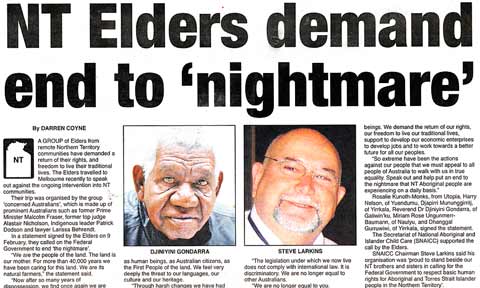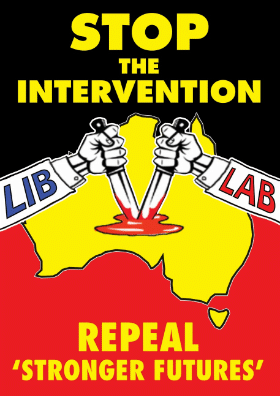Aboriginal timeline: Northern Territory Intervention
Found 49 results for your search. Showing page 2 of 3.
2009
-
From June to August the Department of Families, Housing, Community Services and Indigenous Affairs (FaHCSIA) runs consultations and workshops with Aboriginal people in the NT about future directions of the NTER.
-
Two years since the Northern Territory intervention began. Protests against the NTER held around Australia.
-
With regards to the NT intervention, the Australian Productivity Commission report reiterates two key points: the need for reliable statistics measuring the effects of government measures, and the importance of community ownership of projects and close consultation between community and government.
The things that work generally work because of co-operative approaches between government and communities.
— Australian Productivity Commissioner -
When their community’s sewerage system fails and raw sewage floods the street many members of the Ampilatwatja people walk off to camp in the desert during the Australian winter. They also protest against the NT intervention, ensuring they are no longer subject to the NTER legislation. In August they seek refugee status from the UN as people displaced from their country. ⇒ Aboriginal houses
-
The UN Rapporteur releases his statement on the NT intervention.
-
The Australian government misses the self-imposed deadline to reinstate the Racial Discrimination Act in Northern Territory Aboriginal communities.
It is a simple matter to restore the [Racial Discrimination Act]. Where the [Indigenous Affairs] Minister [Jenny Macklin] appears to be stuck is in trying to find a way to reconcile her desire to over-ride the fundamental human rights of Aboriginal Australians in the NT through compulsory welfare quarantining and mandatory leases with our international obligations not to discriminate on the basis of race.
— Rachel Siewert, Greens senator [1]
2010
-
The final report of the UN's special rapporteur on Indigenous rights, Professor James Anaya, finds the intervention limits the rights and freedoms of Indigenous people in breach of Australia's international obligations.
-
The government passes legislation to re-instate the Racial Discrimination Act by extending compulsory income management nationwide. The administration is estimated to cost taxpayers $350 to $400 million dollars over the next four years, or about $4,000 a person a year. Reports indicate that people under income management feel "severely demoralised". [2]
Re-instating the [Racial Discrimination Act] restores dignity and helps Indigenous Australians to take ownership of their lives and to drive change in the NT.
— Jenny Macklin, Federal Indigenous Affairs Minister [2] -
The Racial Discrimination Act is partially reinstated. Activist groups pledge the full reinstatement of the RDA.
2011
-
The government introduces new legislation to extend key Northern Territory Emergency Response measures for a further 10 years. ⇒ The NT Intervention
-
Respected elders, a former prime minister and other non-Aboriginal 'elders' sign a statement against the ongoing Northern Territory intervention criticising its "discriminatory" nature and the "failure of democratic processes".
We have had enough! We need our independence to live our lives and plan our futures without the constant oppression and threats which have become central to the relationship between government and Aboriginal communities.
— NT elders in their statement [3]
Elders issue a powerful statement in February 2011, demanding an end to the 'nightmare' of the intervention. "As people in our own land, we are shocked by the failure of democratic processes, of the failure to consult with us and the total disregard for us as human beings," the statement reads. [4] -
From June to August the government holds 'consultations' in NT communities to get feedback on the intervention.
-
Northern Territory elders and community representatives issue a statement rejecting an extension of the NT intervention legislation. Aboriginal people were "traumatised" by the intervention, and the government should talk to the elected elders instead of a "chosen few".
-
The government releases an evaluation report of communities affected by the NT intervention which claims that about 80% of people say new police, and 75% better night patrols, improved safety in their communities. The report cites half of the people surveyed strongly agreeing that services had improved. [5]
-
The Australian government introduces the Stronger Futures in the Northern Territory Bill 2011 to the Parliament to extend the intervention. The new laws will be reviewed after 7 years and 'sunset' 10 years after their start.
2012
-
A Senate Committee reports back to government. The committee had travelled to Hermannsburg , Alice Springs, Maningrida and Darwin to record Aboriginal people's evidence as to the harm that had been done to them by the intervention and their rejection of the new Stronger Futures legislation. Federal Indigenous Affairs Minister Jenny Macklin, who had asked for the Senate Inquiry, subsequently overrides the findings by bringing in an early vote.
This unsavoury process shows just how little government cares about the views of Aboriginal people or about working in partnership with NT Aboriginal leaders.
— Michelle Harris, journalist [6] -

Protest poster against the Stronger Futures legislation. The Stronger Futures legislation passes through the lower house. Among the new measures is a potential jail term of 6 months for the possession of a single can of beer, and 18 months for more than 1.35 litres of alcohol.
-
On TV Channel ABC, former prime minister Malcolm Fraser criticises the new government legislation on the NT intervention.
If you could translate it back over 100 years, I think AO Neville, protector from Western Australia, would be proud of this legislation. It is racist. It is paternalistic.
— Malcolm Fraser, former prime minister [7] -
Campaign Stand For Freedom presents 43,000 signatures to the Australian government supporting Aboriginal demands that the Stronger Futures legislation be withdrawn.
-
Despite fierce resistance and a petition with 43,000 signatures, both government and opposition pass the Stronger Futures legislation, extending the Northern Territory Intervention for another 10 years. The laws introduce tougher penalties for alcohol offences (up to 6 months imprisonment for a single can of beer and 18 months for a 6-pack), extend pornography restrictions and continue to prevent courts from taking customary law or cultural practice into consideration. The law introduces the most severe social security penalty in living memory – a 13 week non-payment period – for parents and carers whose children are not attending school regularly.
References
View article sources (7)
[1]
'Intervention protests as deadline missed', Koori Mail 463 p.7
[2]
[2a]
'Concern aplenty as welfare reformed', Koori Mail 479 p.8
[3]
'No More! Enough is enough! - Statement by Northern Territory Elders and Community Representatives', 4/11/2011
[4]
'NT Elders demand end to 'nightmare'', Koori Mail 495 p.11
[5]
'Response to NT Intervention heats up, Koori Mail 513 p.8
[6]
'Democratic process in tatters', Online Opinion, 29/2/2012, www.onlineopinion.com.au/view.asp?article=13309, retrieved 3/3/2012
[7]
'Fraser labels NT intervention laws 'racist'', ABC Online, www.abc.net.au/lateline/content/2012/s3449248.htm, retrieved 14/3/2012

